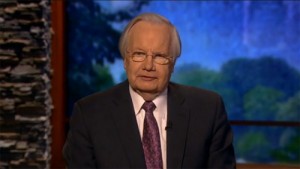 In a web-extended version of his broadcast essay, Bill Moyers gives examples of how indiscriminate killing by our military forces not only cuts down innocent bystanders, but drives “their enraged families and friends straight into the arms of the very terrorists we’re trying to eradicate.” Bill says the Vietnam War, the Iraq War, and President Obama’s prolific use of drones all share a “blind faith in technology, combined with a sense of infallible righteousness.”
In a web-extended version of his broadcast essay, Bill Moyers gives examples of how indiscriminate killing by our military forces not only cuts down innocent bystanders, but drives “their enraged families and friends straight into the arms of the very terrorists we’re trying to eradicate.” Bill says the Vietnam War, the Iraq War, and President Obama’s prolific use of drones all share a “blind faith in technology, combined with a sense of infallible righteousness.”
Bill Moyers Essay: When We Kill Without Caring from BillMoyers.com on Vimeo.
TRANSCRIPT:
I’m Bill Moyers. This week, the New York Times published a chilling account of how indiscriminate killing remains bad policy even today. This time, it’s done not by young G.I.’s in the field but by anonymous puppeteers guiding drones by remote control against targets thousands of miles away, often killing the innocent and driving their enraged families and friends straight into the arms of the very terrorists we’re trying to eradicate.
The Times told of a Muslim cleric in Yemen named Salem Ahmed bin Ali Jaber, standing in a village mosque denouncing Al Qaeda. It was a brave thing to do — a respected tribal figure, arguing against terrorism. But two days later, when he and a police officer cousin agreed to meet with three Al Qaeda members to continue the argument, all five men — friend and foe — were incinerated by an American drone attack.
The killings infuriated the village and prompted rumors of an upwelling of support in the town for Al Qaeda, because, the Times reported, “such a move is seen as the only way to retaliate against the United States.”Our blind faith in technology combined with a sense of infallible righteousness continues unabated. It brought us to grief in Vietnam and Iraq and may do so again with President Obama’s cold-blooded use of drones and his seeming indifference to so-called “collateral damage,” otherwise known as innocent bystanders. By the standards of slaughter in Vietnam the deaths by drone are hardly a blip on the consciousness of official Washington.
But we have to wonder if each one — a young boy gathering wood at dawn, unsuspecting of his imminent annihilation, the student picking up the wrong hitchhikers, that tribal elder standing up against fanatics — doesn’t give rise to second thoughts by those judges who prematurely handed our president the Nobel Prize for Peace. Better they had kept it on the shelf in hopeful waiting, untarnished.

You must be logged in to post a comment Login